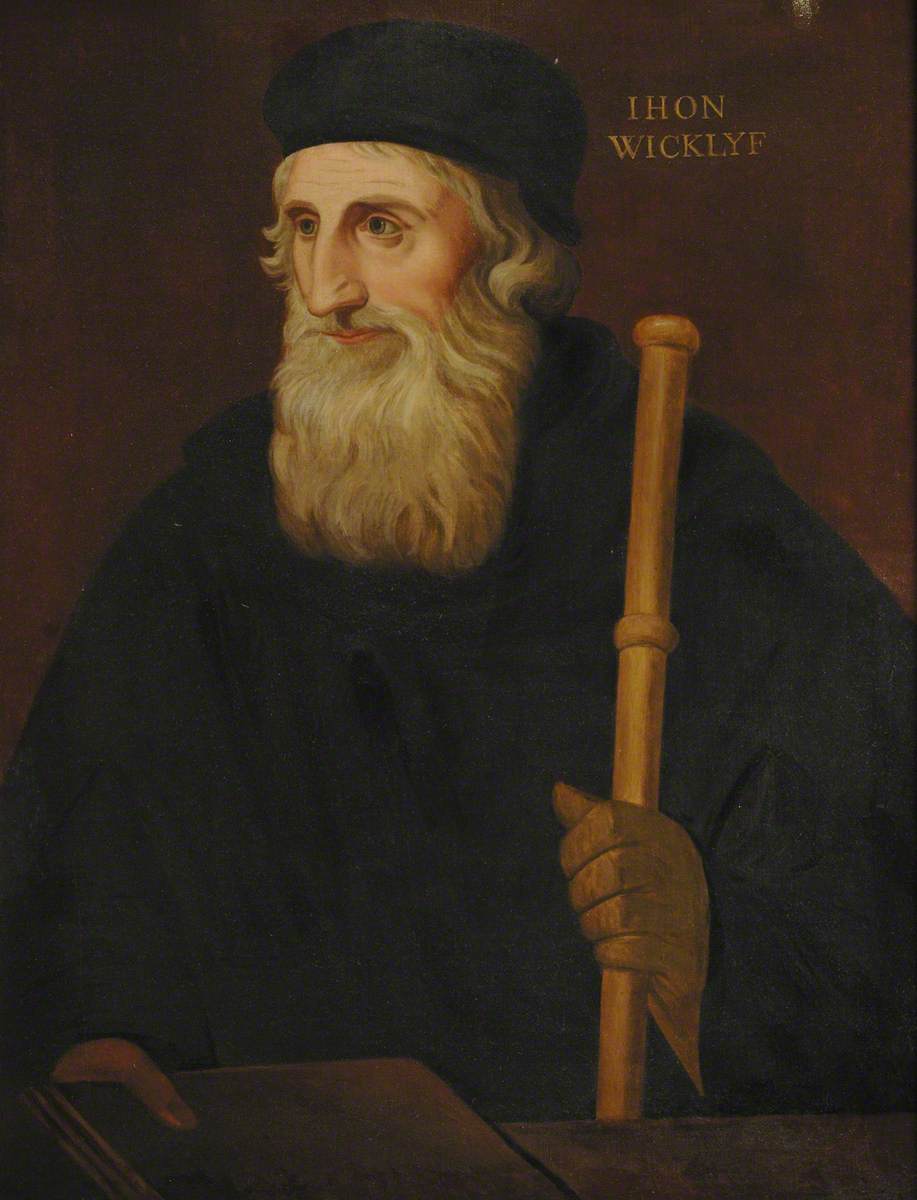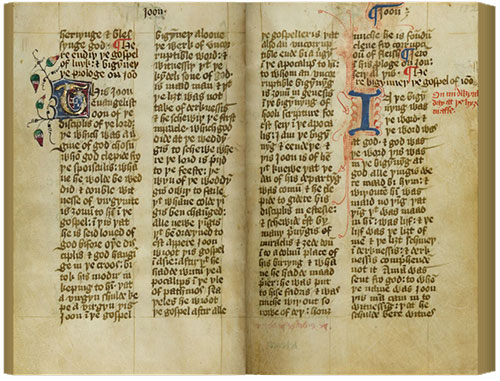|
John Wycliffe has been called “the Morning Star of the Reformation,” which refers to the Protestant Reformation. One hundred years before Martin Luther nailed his 95 theses to the Wittenberg Castle Church door in Germany in 1517 as part of the Protestant Reformation, Wycliffe took a bold stand and worked to bring change or reform to the Roman church by speaking the truth of God’s Word. He translated the Bible into English. And he took a courageous stand by speaking and writing God’s Word in the common language of the English people. He had a tremendous impact in his day. John Wycliffe was born in 1328 near Richmond in the North Riding of Yorkshire, England. We attended Oxford as a teenager in 1346. He received a bachelors degree in divinity in 1369 and a doctorate in 1372. Wycliffe studied and taught at Oxford for most of his life. He studied hard and became a recognized leading theologian and philosopher at Oxford University. As he studied, he realized that many of the mainstream religious teachings of the Roman church was not in alignment and harmony with the spiritual truths in the Bible. And he wanted to change that. In the 1300’s, the Roman church dominated all of Europe. The church was very powerful. It owned a lot of land throughout Europe. It demanded money and allegiance from people and governments. It influenced religion, philosophy, science, morals, politics, art, and education. But the church’s doctrine had become mixed up with half-truths and superstitions. For example, people were (and still are) required to acknowledge the pope as God’s representative on Earth. Anyone who disagreed with the pope and church were prosecuted or executed. Wycliffe taught what he learned from his studies, which was that all spiritual truth is in the Bible and that to know Christ and have spirit within, one must understand those truths. He questioned the church and its teachings that did not line up with the truth that he understood and was written in the Bible. For example, the Roman church taught that salvation (to be saved, reborn and connected with God) is NOT by God’s grace and through believing, but is through good works prescribed by the church. According to the church, the way to God is by following the law of the church according to their rules. The church forbade anyone who wasn’t a church-ordained priest to read the Bible or teach from it. Another example is that the church required people to confess their sins to priests and the church had the authority to forgive people of their sins. Private confession to God for forgiveness of sins had been replaced by confession to priests. But Wycliffe confronted the church on this. Wycliffe also spoke out again the sales of “indulgences.” According to the church, a person could pay the church money and the church would in turn free them from being punished for their sins. And with the money, the church would purchase more land and build more churches and fund armies for war. The Christian Crusades were church-sanctioned and funded war campaigns to combat paganism and heresy, and to gain political and territorial power. Wycliffe also spoke out again the church’s greed. Much of England’s land and wealth was in control of the church. The church and everyone who worked in the church (the pope, bishops, clergy, priests, friars, monks) were more interested in wealth and power rather than attending to the spiritual needs of the people who believed in God. Wycliffe proclaimed that the clergy (the body of all people ordained for religious duties in the church) are not to rule over, but rather serve and help people. Wycliffe spoke publicly that the church lived in greed while common folk struggled under a burden of need. Wycliffe spoke out against celibacy of the priests, praying to saints, and other practices that were not based upon God’s Word. The church was (and still is today) filled with dogma (principles laid down by the church authority as being incontrovertibly true). He also attacked the dogma of transubstantiation. Wycliffe opposed the beliefs that the bread and wine given at communion are literally transformed into the body and blood of Christ. He enraged the church and was condemned as a heretic. He was a dissenter and a non-conformist who held and proclaimed opinions that were at odds with what the church said was the way, the truth, and the rules to follow or else. But that didn’t stop him from studying, teaching, and speaking spiritual truths. We was one of the most influential preachers in England, and he encouraged others to speak the Word too. He said, “The highest service to which man may attain on earth is to preach the love of God.” One of Wycliffe’s major concerns was that the church forbade translations of the Bible into the common language of the people. The church used a bible that was written in Latin, a language that most people in England did not understand or speak. For centuries, the church used the Latin translated bible for readings and teachings. Only the university-educated church clergy could read and teach from the Latin bible. But Wycliffe believed and taught that people could not know the basics of believing unless they knew the Bible, and they could best know the Bible when it was in their own language. He said, “People should understand believing and, as the instructions for believing are in the Scriptures, believers should have the Scriptures in a language which they fully understand.” Wycliffe called for the Bible to be translated into English. He worked with scholars to translate the entire bible from Latin into English, painstakingly making copies of the Bible by hand. Wycliffe wrote the very first translation of the whole bible into English. In 1384, people in England could read the entire bible for themselves. Hundreds were produced by hand and given to people who would carry the English translations of the Bible with them as they preached God’s Word throughout England. The English translation of the Bible was one of Wycliffe’s greatest accomplishments. In 1382, the church declared John Wycliffe as a heretic and banished him from Oxford University. As he left the school, he declared, “The truth shall prevail!” He also said, "I believe that in the end the truth shall conquer." In 1384, Wycliffe died peacefully in his home. Four years later, Pope Martin V of the Roman church ordered Wycliffe’s bones to be dug up, burned, and his ashes thrown into the river. The church wanted to erase everything of John Wycliffe from the face of the earth. The church also tried to burn and destroy all of Wycliffe’s books and writings, but the church failed. Wycliffe’s teachings and writings had already spread throughout England and Europe.
In 1408, the Roman Church declared that no one was permitted to translate on his own authority any text of Scripture into the English language or any other language. But the invention of the printing press in 1450 changed all of that. Translations of the Bible could not be stopped. The printing press made it possible to replace handwritten copies of the Bible with printed editions that were affordable. The bible was translated into many languages, including German, Italian, and Czech. In 1522, Martin Luther, a German theologian, monk, and teacher, translated the entire bible from Hebrew and Greek into German. Luther studied and incorporated many of Wycliffe's ideas about the church and the truth for his own reformation activities. By 1530, an estimated two hundred thousand copies of Martin Luther’s translation were printed. Luther’s bible translation became the foundation for all future translations and versions in Europe. In 1526, William Tyndale translated the Bible from Hebrew and Greek into English. Tyndale was executed by the church soon after. In 1539, King Henry VII used Tyndale's Bible to translate an authorized edition of the bible in English to be read aloud in all of the services of the Church of England. Every parish church in England was required to have a copy of an English translation of the Bible made available to everyone in the congregation. At last, Wycliffe’s vision was fulfilled. All of the people of England had access to the Bible in their own language. In 1611, the King James Version of the Bible (which as built off of Tyndale's bible) was printed and published. The King James Bible has been translated into about 700 different languages. It’s considered the best-selling book of all time. Wycliffe’s vision to make God’s Word available in the language of the common people has come true. It took a lot of courage for John Wycliffe to translate the Bible into English back then. He risked everything and inspired other future translators. Because of his dedication and work to speak the truth, the truth did prevail. How thankful we can be for John Wycliffe. Let’s continue to follow the example of John Wycliffe by standing for truth, and speaking and living the spiritual truths that we know and believe. If you enjoyed this article, you may be interested in reading more at The Kings Guide. Reference: John Wycliffe article by Rodney Grilliot, The Way Magazine, October 2020. Photo Credit: Wycliffe by Thomas Kirby, Balliol College |
Archives
December 2021
|





